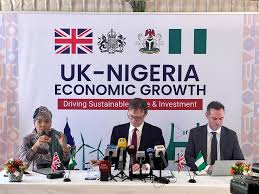British businesses are showing growing interest in Nigeria and other African countries as the continent becomes a key target for international investments. This development is driven by Africa’s vast mineral resources, youthful population, and economic reforms that are attracting foreign companies. A recent report by the UK-based Strategy Management Partners revealed that many UK companies now see Africa not just as a frontier market but as a vital growth region with long-term opportunities.
The report, which surveyed 250 UK business leaders, including Chief Executive Officers and Heads of Strategy, found that 50 percent of UK companies with over £20 million in annual turnover are already operating in Africa and have plans to expand. Another 28 percent expressed interest in the continent but are still uncertain about the best way to establish operations.
Africa’s appeal stems from its natural wealth and human capital. The continent holds 30 percent of the world’s mineral reserves, 8 percent of global natural gas reserves, and more than 12 percent of oil reserves. It also has 65 percent of the world’s arable land. By 2035, Africa is projected to account for a quarter of the global workforce, making it an attractive destination for industries that rely on labour and resources.
Seven sectors are particularly attracting international capital: technology, oil and gas, renewable energy, agriculture, manufacturing, infrastructure, and strategic minerals. Digital technology stands out because of Africa’s growing population of digital natives, while industrialisation through Special Economic Zones is positioning the continent as a competitive manufacturing hub.
The report described Africa as being at a crucial point of transformation. Historically viewed as a source of raw materials, Africa is now emerging as a vibrant economic region, fuelled by innovation, a youthful population, and regional integration efforts like the African Continental Free Trade Area (AfCFTA).
The United States, however, seems to be reducing its trade engagement with Nigeria. Official data from the US Census Bureau showed that the US cut imports from Nigeria by $527 million in the first five months of 2025 compared to the same period in 2024. This 20 percent decline follows new protectionist policies introduced by US President Donald Trump, including a general 10 percent import tariff on most countries and a higher 14 percent tariff on Nigerian goods.
Trump’s administration also threatened an extra 10 percent tariff on countries aligning with the BRICS bloc, where Nigeria is a prospective member. This shift in US policy appears to have opened opportunities for UK businesses to strengthen their presence in Nigeria.
Recently, the Foreign Commonwealth and Development Office and the British Deputy High Commission reported that 27 UK companies in fintech, enterprise technology, and sustainability visited Nigeria with the Mayor of London, Sadiq Khan. The delegation connected with Nigerian policymakers and investors to explore partnerships and business opportunities.
During his visit to Lagos, Sadiq Khan highlighted the potential for deeper economic ties between the UK and Nigeria. He described Africa as having the world’s fastest-growing population and significant economic growth prospects. Khan stressed that his visit was to promote trade, investment, and collaboration in sectors such as finance, education, health, tech, and sustainability.
Muibat Ijaiya, a Partner at Strategy Management Partners, noted that Africa’s strategic value for UK investors is clear, but she stressed the need for stronger cooperation with African governments to address infrastructure gaps, regulatory hurdles, and trade barriers. She said aligning public policies with private investment is necessary for long-term growth.
However, the report also warned that Africa’s potential comes with risks, including political instability, currency fluctuations, complex regulatory frameworks, and weak property rights. Investors have cited these as persistent challenges, despite the continent’s growing attractiveness.
Infrastructure expert Babatunji Adegoke, Treasurer of the Nigerian Society of Engineers (Victoria Island Branch), advocated for an increased focus on Public-Private Partnerships (PPPs) to address Nigeria’s infrastructure gaps and attract more foreign investments. Speaking with our correspondent, Adegoke argued that PPPs provide a structured pathway for financing and developing strategic sectors like mining, energy, and transportation.
He said, “PPP is not just an option; it’s a necessary strategy. With a clear framework and the right incentives, Nigeria can use PPPs to drive Foreign Direct Investment, especially in developing critical minerals like lithium.”
Adegoke also highlighted the importance of local professionals in ensuring that PPPs are designed to meet Nigeria’s unique challenges, ensuring sustainability and investor confidence.
Strategic minerals such as cobalt, manganese, graphite, and lithium are increasingly placing Africa at the centre of the global energy transition. These resources are essential for producing electric vehicle batteries, solar panels, and high-tech products. African countries are now focusing on local processing of these minerals rather than exporting raw materials, a move aimed at ensuring that value creation stays within the continent.
Governments across Africa are not idle. South Africa, for instance, is reforming tariffs, while Nigeria is exploring trade concessions under the AfCFTA to encourage cross-border trade. So far, 23 African countries have adopted preferential tariffs, while China has scrapped tariffs on imports from 53 African nations, further boosting trade dynamics.
Adegoke called on Nigerian government agencies to speed up reforms around PPPs and make the country more attractive to foreign investors by providing clear policies and protecting investor interests. He noted that partnerships between the government and private sector could unlock the potential of Nigeria’s strategic minerals and infrastructure.
Africa is at a pivotal moment, with its population, resources, and reforms creating a compelling investment story. For UK businesses, this is an opportunity to invest not just for profit but also to be part of Africa’s evolving economic narrative. Those who engage strategically and responsibly may find themselves contributing to the continent’s next phase of growth.
